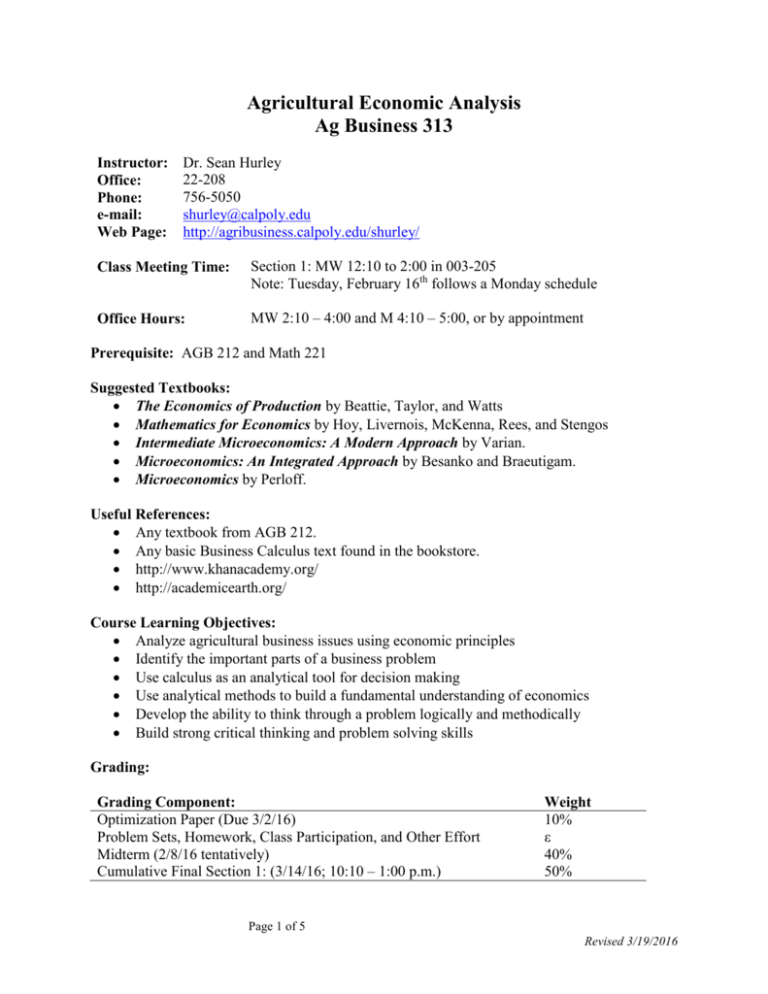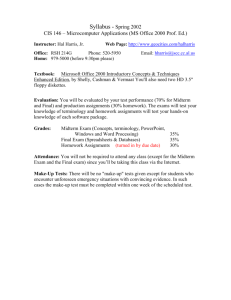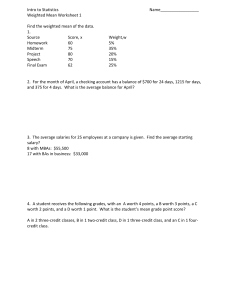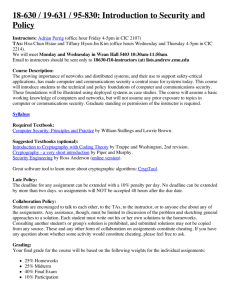AGB 313 Syllabus
advertisement

Agricultural Economic Analysis Ag Business 313 Instructor: Office: Phone: e-mail: Web Page: Dr. Sean Hurley 22-208 756-5050 shurley@calpoly.edu http://agribusiness.calpoly.edu/shurley/ Class Meeting Time: Section 1: MW 12:10 to 2:00 in 003-205 Note: Tuesday, February 16th follows a Monday schedule Office Hours: MW 2:10 – 4:00 and M 4:10 – 5:00, or by appointment Prerequisite: AGB 212 and Math 221 Suggested Textbooks: The Economics of Production by Beattie, Taylor, and Watts Mathematics for Economics by Hoy, Livernois, McKenna, Rees, and Stengos Intermediate Microeconomics: A Modern Approach by Varian. Microeconomics: An Integrated Approach by Besanko and Braeutigam. Microeconomics by Perloff. Useful References: Any textbook from AGB 212. Any basic Business Calculus text found in the bookstore. http://www.khanacademy.org/ http://academicearth.org/ Course Learning Objectives: Analyze agricultural business issues using economic principles Identify the important parts of a business problem Use calculus as an analytical tool for decision making Use analytical methods to build a fundamental understanding of economics Develop the ability to think through a problem logically and methodically Build strong critical thinking and problem solving skills Grading: Grading Component: Optimization Paper (Due 3/2/16) Problem Sets, Homework, Class Participation, and Other Effort Midterm (2/8/16 tentatively) Cumulative Final Section 1: (3/14/16; 10:10 – 1:00 p.m.) Weight 10% ε 40% 50% Page 1 of 5 Revised 3/19/2016 There are two exams for the course, a midterm and a cumulative final. There will be approximately two to three homework assignments and three to four problem sets. The problem sets are meant to be more challenging and longer than the homework problems, so you can expect that they should take on average at least four to six hours of work. You are allowed and encouraged to work on the problem sets and homework in groups. If you work in groups on the problem sets and/or homework assignments, make sure that you personally know how to do each problem. While problem sets and homework assignments have no specific weighting allocated to them, you are strongly encouraged to do them. If you would like feedback on your homework assignments or problem sets, you will need to submit them to the professor by the due date. Since this course is about optimization and problem solving, you will need to write a maximum two page paper on a problem that you have encountered and explain how you solved it. Any papers over two pages will receive a 20 point deduction. This paper is meant to be a thought paper that will hopefully link what you are learning in class to your everyday life. Please make sure that your writing style is formal. There are four major components you should discuss in the paper. The first component of the paper will have you elaborate on what optimization problem you tried to solve, e.g., maximizing your score for a game, minimizing the amount of reading you did for a class, maximizing the number of events you participated in during the quarter, etc. The next part of the paper will have you discuss what the decision variables for the problem you solved are, and how they are related to your objective you tried maximizing. The third part of the paper will explain what constraints you encountered when trying to solve the problem. This portion of the paper should incorporate how your constraints are affecting the decision variables. The fourth component of the paper will explain how you went about solving the problem. The paper should be well written and is worth 100 points. It should be sent to me by email and a paper copy must also be submitted. Failure to send me an emailed copy will get you a zero for the assignment. For every spelling and grammatical error that is found written in the paper, up to 10 points will be deducted for each error up to 50 points. If you have more than six grammatical errors, you will need to resubmit the paper corrected for all the mistakes and you will receive at most the lowest score given to the other students. I would encourage you to write it well the first time. The second part of the grading will examine how well you discuss the four major components that are asked for in the paper. Make sure you thoroughly discuss how your decision variables are incorporated into your constraints. I will discuss more about the paper in class. I encourage you to come to my office hours to discuss your paper. Early papers will be joyously accepted, but late papers will receive at most half credit. While this course is primarily lecture oriented, class participation is strongly encouraged. It is a minimum expectation of the professor that you will ask questions when you are confused on a topic being covered in the course.1 To motivate class participation and give you incentive to do your problem sets and homework assignments, a value of ε is being used. The term ε in 1 It is highly likely that the question you have is the same as many other students in class. Please do not hesitate to ask questions. Page 2 of 5 Revised 3/19/2016 mathematics is often used to mean a small number. In the case of this course, ε is being used as the professor’s subjective measure that he will assign to each student for his/her participation and effort in the course. Note that turning in problem sets and homework assignments is one demonstration of effort. The value of ε will be nonnegative and worth no more than 3%, i.e., 3% ≥ ε ≥ 0. It will only be given a positive value for extraordinary class participation and/or effort. Please note that ε can take a student above 100% making this measure similar to extra credit. Also, you should expect the percentage of students getting a positive ε will be no larger than 20% of the class. Please note that ε is non-negotiable and any attempt to do so will guarantee that a zero for this value is assigned to the person that attempts to negotiate. Final Grade Your final grade will be based on the weighted average of the grading components of the course that are listed above. Guaranteed grades will be issued on the following scale: 90% of weighted average guarantees an A80% of weighted average guarantees a B70% of weighted average guarantees a C60% of weighted average guarantees a DBelow 60% of weighted average guarantees an F Straight grades and pluses, e.g., A, B, B+, etc., will be determined by natural breaks in the distribution. Since the final is cumulative for this course, if you do considerably better on the final than on the midterm, i.e., greater than 10%, then I will shift your homework and problem sets percentage worth of your midterm weighting to your final. For example, if you get 50% on your midterm, 100% on your final, 100% on your paper, and a 90% on your homework and problem sets, your weighted final grade would be 98% rather than 80%. Professor’s Expectation It is the expectation of the professor that you will spend approximately TWO hours outside of class for every hour you are supposed to spend in class working on problem sets, homework assignments, and studying. These hours may not be distributed uniformly. Please budget your time wisely. Course Policies Right to Syllabus Change Policy The instructor reserves the right to make any changes to this syllabus at anytime during the course. If a change is made, a new syllabus will be handed out. Students with Learning and/or Physical Disability Policy Any student with a learning and/or physical disability who needs accommodations or assistance in this course should make an appointment to speak with the instructor as soon as possible. Page 3 of 5 Revised 3/19/2016 Cheating Policy Cheating/academic dishonesty will not be tolerated in the course. If you are discovered cheating or are an accomplice in helping someone cheat on an exam, quiz, or homework you will receive a zero on the respective item. You will also be reported to the dean’s office for disciplinary matters. For a description on Cal Poly’s cheating policy please go to the following web page: http://www.academicprograms.calpoly.edu/content/academicpolicies/cheating. Cell Phone and Texting Cell phones are strictly prohibited on exam days. If you are caught with one, you will receive a zero on the exam. During class time cell phones must be turned to silent mode. If you have a call, you must take it outside the classroom. If the instructor hears your cell phone and is able to identify you in class, he has the option of deducting up to 5% off your final grade for each occurrence. If the professor catches you texting in class, you will receive a 3% deduction from your final weighted grade for each occurrence. If you do not wish to have the deductions from your grade for either your cell phone “ringing” or you texting, you will need to purchase a slice of pizza or its equivalent for each student in the class for the next class meeting. Make-Up or Early Exam Policy No make-up exams will be given in the course except for the final. If you miss a midterm for a valid reason, then the weighting for that midterm will be placed on the final. If you miss a final for a valid reason, you will receive an Incomplete grade in the course and will be required to take a make-up exam within the first four weeks of the next quarter you attend. There are only two valid reasons for missing an exam: 1) a family member dies, or 2) you are unexpectedly sick or injured to the point that you need to see a medical doctor the day of the exam. If a family member passes away, you will need to bring to the make-up exam the death certificate or some other corroborating information that the individual who died was close to you to be able to take it. Please note that the family pet is not considered a family member under this policy. If you are unexpectedly sick or injured to the point that you need to see a medical doctor the day of the exam, you will need to bring a note from the doctor that explains that the illness or injury was so bad that there would have been no way you could have taken the exam the day it was scheduled. Family vacations or any other type of vacations are not an acceptable reason for obtaining a make-up exam. No early exams will be given. Classroom Civility Policy It is expected that you will be respectful to both the professor and other classmates. If you choose to be disrespectful, you will either 1) be asked to leave and your total grade will be adjusted down by three percentage points, or 2) you will be required to come to the board and lecture on the concept being presented, and your total grade will be affected by zero to three percent dependent upon how well you present the material. Anything that is disruptive to the class is deemed disrespectful including the following behavior: Listening to your music player when lecture is in session Playing games on your mobile device/computer Talking loudly during lecture that is not related to the course Packing your bag before class is finished Page 4 of 5 Revised 3/19/2016 Consistently arriving late to class without providing a valid reason to the professor Verbally attacking a person rather than attacking the person’s ideas Leaving early without telling the professor beforehand (The only exception to this is if you become ill during class. In this case, please email the professor afterwards.) Showing-up to class intoxicated Chewing tobacco Bringing your pet to class FERPA Policies The professor of this course respects your FERPA rights. As a policy, the professor will only discuss your grades to you in person. No grades will be given over the phone or through email. No student other than yourself will be allowed to pick up your homework, problem sets, or exams. To facilitate the class, the professor may call on you by name. If you would prefer your name not to be used in the course, it is your responsibility to notify the professor in writing by the end of the first week. Dr. Hurley’s Keys to Success: Attend ALL classes!!! Do all the homework and problem sets Understand the homework and problem sets Work in groups to do the homework and problem sets Work on all previous finals posted on Dr. Hurley’s website!!! Start all homework and problem sets on the day they are distributed Utilize Dr. Hurley’s office hours Ask questions in class Attend ALL classes!!! Topics for Ag Bus 313 Topic AGB 212 Review Math Review and Lessons in Calculus Unconstrained and Constrained Optimization Technology Cost Minimization Cost Curves Profit Maximization Game Theory and Game Applications Consumer Choice, Utility, and Revealed Preference (If time allows.) Risk and Uncertainty (If time allows.) A Philosophy to live by: Some of the things I understand were taught to me. Most of the things I understand I taught myself. Page 5 of 5 Revised 3/19/2016




